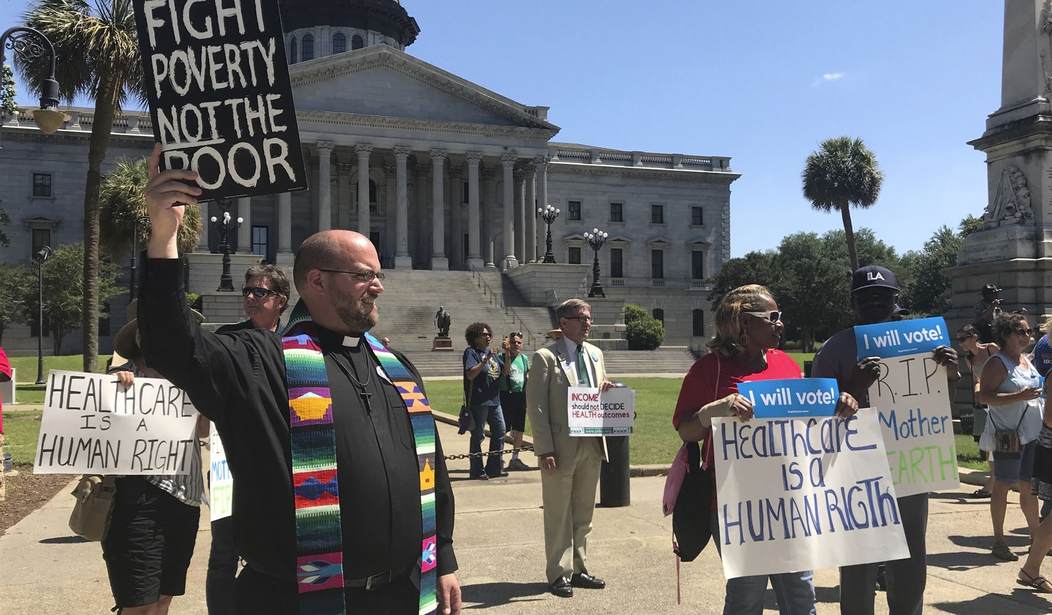According to a new report by the Government Accountability Office (GAO), Medicaid is the most fraud-ridden program in the entire federal government.
Per the report, “The Centers for Medicare & Medicaid Services has taken steps, but further efforts are needed to reduce improper payments, ensure the appropriate use of program dollars, and improve program data.”
Since 2003, GAO, a non-partisan government watchdog, has designated Medicaid a “high risk” program.
Unfortunately, in the 18 years that Medicaid has been deemed a “high risk” program, little progress has been made in combating the improper payments that have become rampant throughout the program.
As the report notes, “In fiscal year 2020, Medicaid covered an estimated 77 million low-income and medically needy individuals at a cost of $673 billion, of which $419 billion was financed by the federal government. … Medicaid improper payments represented about 21.4 percent of federal program spending—more than $85 billion—in fiscal year 2020, an increase of nearly $30 billion from 2019.”
Moreover, “States have increased their reliance on provider taxes and local governments to finance the nonfederal share of Medicaid spending, particularly for supplemental payments to providers. These payments are not linked to claims for beneficiary services and represent a growing share of Medicaid spending, totaling more than $46.3 billion in 2017, the most recent year for which data are available.”
And, “CMS’s oversight of Medicaid often relies on state-reported expenditure and utilization data. Incomplete and inconsistent state data complicate program oversight.”
In other words, Medicaid—one of the largest government programs in existence—is fraught with waste, fraud, and abuse.
Unsurprisingly, the GAO report attracted attention from lawmakers on Capitol Hill, who penned a letter to CMS Administrator Chiquita Brooks-LaSure.
According to the letter, “The Center for Medicare and Medicaid Services’ (CMS) own numbers show that in Fiscal Year (FY) 2019, Medicaid made $57.36 billion in improper payments representing 32.8 percent of all improper payments across the federal government. According to CMS, in FY 2020, improper payments rose to $86.9 billion, meaning more than 1 out of every 5 Medicaid payments were improper. This is an unacceptable waste of American taxpayer dollars.”
The lawmakers also state, “These abuses are even more concerning since from 2015 to 2019 CMS did not audit states’ Medicaid eligibility determinations. While CMS began working on an audit during 2020, it was delayed due to the COVID-19 pandemic. Failing to audit state Medicaid eligibility determinations in the midst of a dramatic expansion of Medicaid under Obamacare has more than tripled the amount of improper spending. The growth in improper payments is directly linked to states being incentivized to game the system by improperly classifying people as expansion enrollees to receive greater reimbursement rates.”
It should come as no surprise that Medicaid is rife with improper payments, given how much the program has expanded in recent years.
In 1965, President Johnson signed a law authorizing the creation of Medicaid. At the time, it was specifically limited to Americans receiving cash assistance from the federal government.
However, throughout the decades, Medicaid eligibility has been expanded several times. As is the case with almost every government entitlement program.
Yet, as these programs become bigger, the harder it is to police for corruption, fraud, and general malfeasance.
And, as these programs grow in size and scope, so do their costs.
For example, in 1975, total Medicaid spending was $13.1 billion. By 1995, it ballooned to $159 billion. Twenty years later, in 2015, Medicaid costs totaled $549 billion. By 2020, this figure was a whopping $673 billion.
Medicaid, like far too many government programs, is simply on an unsustainable trajectory.
Perhaps it is time to reassess and reform the program.
Fortunately, there are several options on the table that lawmakers could use to reform Medicaid from the ground up. These include the introduction of health savings accounts, implementing minimal co-pays, enforcing work requirements for able-bodied adults without dependents, and many more.
Medicaid is a laudable program that has helped millions of Americans over the years. It need not be demolished, but it is certainly in need of dire reform.
Chris Talgo ([email protected]) is senior editor at The Heartland Institute.












Join the conversation as a VIP Member